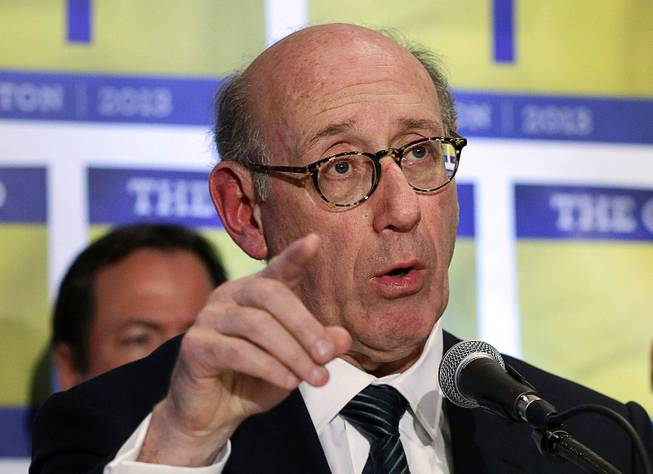
Elise Amendola / AP
In this April 23, 2013 file photo, Kenneth Feinberg speaks at a news conference in Boston. General Motors hired Feinberg to explore ways to compensate victims of accidents connected to defective ignition switches in its small cars. Now he will be overseeing the compensation of the victims of the Oct. 1, 2017, mass shooting in Las Vegas.
Published Tuesday, Oct. 10, 2017 | 6 p.m.
Updated Tuesday, Oct. 10, 2017 | 9:50 p.m.
Distribution of the millions of dollars donated for those injured or killed during the Oct. 1 mass shooting will be overseen by a nationally recognized victim compensation expert who spearheaded the September 11th Victim Compensation Fund.
Clark County announced Tuesday that attorney Kenneth Feinberg has agreed to lead the effort to distribute funds from the Las Vegas Victims’ Fund established by Commission Chairman Steve Sisolak and Sheriff Joe Lombardo hours after the mass shooting that left 58 dead and hundreds more injured. That fund has so far raised more than $10.5 million from more than 84,000 people and businesses via the crowdfunding website GoFundMe. Approximately $4 million in additional money has been donated to other accounts or pledged by companies.
Feinberg was appointed as special master of funds dedicated to victims of 9/11. From 2001 to 2004, the September 11th Victim Compensation Fund distributed more than $7 billion to families of the 2,880 people who died in the attacks and to 2,680 people who were injured in the attacks or during immediate rescue efforts.
More recently, Feinberg was involved in victim compensation efforts in Orlando and Boston. Approximately $29 million was fundraised in Orlando following the mass shooting at the Pulse Nightclub that left 49 people dead and 58 wounded. Almost $62 million was raised after the bombings at the Boston Marathon left three dead and hundreds wounded.
The Las Vegas Victims’ Fund is being overseen by the National Center for Victims of Crime and its National Compassion Fund. Sisolak has noted that the county will have “absolutely no role” in how the money is distributed and its role will be limited to identifying and referring the areas of highest need.
A spokesperson for the National Compassion Fund previously said that compensation will be based solely off type of injury and will not factor in age, income or insurance coverage. All money will go directly to victims and not third parties like nonprofits or hospitals. Victims and their surviving family members are free to spend their money however they choose.
Feinberg elaborated on this concept during a conference call with media on Tuesday, saying that length of hospital stay has typically been used as a simple but effective proxy for determining how serious injuries were.
“What we are looking for is a speedy process,” he said. “If you were in the hospital a month, you get X. Three weeks, you get Y ...”
Requiring extensive medical records and a thorough examination of seriousness would only complicate and stretch out the process, although he did note that precautions are put in place to verify that claimants were at the festival and treated for injuries. Feinberg hopes to have money distributed to victims in approximately three to four months.
“That’s what we call rough justice,” he says. “It’s necessary in order to get the money out as fast and as efficiently as possible.”
Feinberg prefaced his comments by noting that all relevant parties have not officially collaborated or agreed to any distribution calculation yet. A press release distributed by the county stated that one of the first steps will be “the creation of a diverse committee of community leaders who will be responsible for creating a model for the distribution of funds in a manner that is transparent, timely and equitable.”
The process for forming that committee has not yet been determined.
Feinberg stressed that “the most important thing” is for everyone managing donations to agree to follow the same distribution system, either by using the same calculation formula or by pooling all the money together and distributing it as one large lump sum. He says the initial collaboration has been positive and that multiple entities, including the county’s chief financial officer, independently reached out to him for guidance on how best to manage and distribute funds.
“All signs point to Las Vegas coming together in an effort to help these people,” he said.
Donations are still being collected for the Las Vegas Victims’ Fund. After the Boston Marathon bombing, donations were collected up to 48 hours before the planned distribution to maximize the amount of money given out.
Feinberg said he could not provide any estimates on how much individual victims or their surviving relatives could expect to receive.
“Money is a poor substitute for loss and injury,” he added. “A check is a pretty hollow substitute for lost loved ones or horribly injured people. All we can do with a fund like this is provide some small degree of financial certainty for the transition. Anybody who thinks the money provided is a successful substitute is vastly mistaken.”

Join the Discussion:
Check this out for a full explanation of our conversion to the LiveFyre commenting system and instructions on how to sign up for an account.
Full comments policy